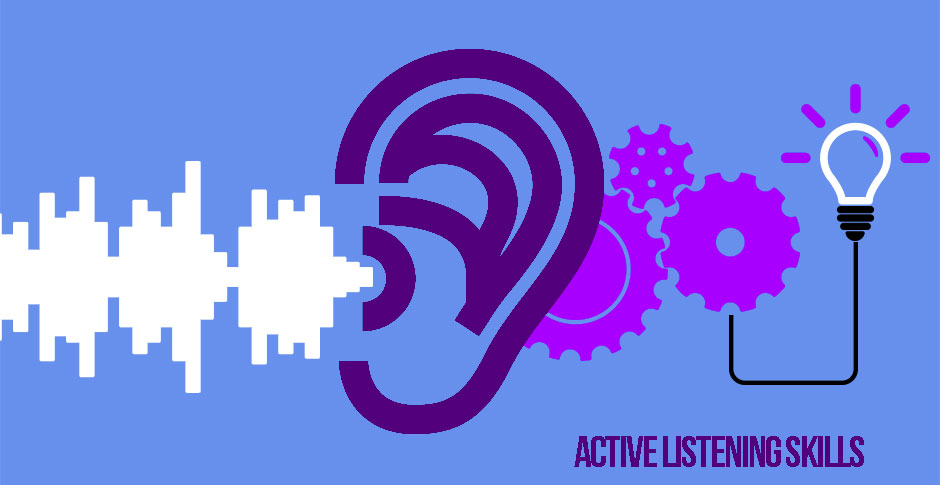In the hustle and bustle of university life, it’s easy to forget a golden nugget of wisdom that we’ve heard since childhood: we have two ears and one mouth, so we should listen twice as much as we speak. The power of listening, however, often falls by the wayside amidst our conversations, debates, and discussions.
Remember, the more you listen, the more knowledge you acquire, the more likeable you become, and the more engaging you are in conversations. A good listener always ends up being more popular than a good talker, as they let people engage with their favourite speakers – themselves.
Active listeners are appreciated and liked by others for a variety of reasons:
- Makes Others Feel Valued: Active listeners make the speaker feel important and valued. They give their undivided attention and validate the speaker’s thoughts and emotions, fostering a sense of respect and understanding.
- Fosters Clearer Communication: Active listening promotes clarity in communication. By summarizing, asking relevant questions, and avoiding interruptions, active listeners ensure that the message conveyed is correctly understood, reducing the chance of miscommunication.
- Builds Stronger Relationships: Active listening builds trust and rapport in relationships. It demonstrates empathy and understanding, making others feel comfortable and secure, thereby strengthening personal and professional relationships.
- Encourages Openness: People are more likely to open up and share their thoughts, ideas, or feelings with someone who actively listens to them. This openness can lead to deeper conversations and more meaningful connections.
- Promotes Problem-Solving: Active listeners often make good problem-solvers. By fully understanding the problem at hand through active listening, they can provide more informed advice or solutions.
- Decreases Conflict: Active listening can decrease the potential for conflict. By showing that they understand and respect another person’s perspective, an active listener can defuse tense situations and facilitate resolution.
- Enhances Learning: People tend to share more information with those who listen actively. Thus, active listeners often have more opportunities to learn and grow.
Fostering Active Listening: A Behavioural Adjustment

Being a good listener is not something that happens overnight – it’s the outcome of several small behavioural and attitudinal adjustments. When someone is talking, give them your full attention. Looking at the speaker provides natural feedback, and leaning towards them shows your interest in their ideas.
At the right moments, ask pertinent questions. This shows the speaker that you’re engaged with their thoughts. But remember, don’t interrupt. Allow the speaker to finish their point before you ask your question.
Some small behavioural adjustments you can start making today to become an active listener are:
- Maintain Eye Contact: This signals to the speaker that you are engaged and focused on what they’re saying.
- Nod and Show Affirmative Body Language: Subtle affirmations like nodding your head or leaning in slightly indicate that you’re actively participating in the conversation.
- Avoid Interruptions: Allow the speaker to complete their thought before responding. Resist the urge to interject or offer your perspective midway through their sentence.
- Practice Patience: Not every pause needs to be filled immediately. Give the speaker time to collect their thoughts and express themselves fully.
- Ask Open-Ended Questions: These types of questions demonstrate your interest and encourage the speaker to share more detailed information.
- Paraphrase and Summarize: Restating key points in your own words helps ensure you’ve correctly understood the speaker, and it shows that you’re fully engaged in the conversation.
- Provide Feedback: Providing relevant responses or comments shows the speaker you understand their perspective. But be sure to wait until they’ve finished talking.
- Eliminate Distractions: Try to minimize any potential distractions, such as turning off or silencing your phone, closing unnecessary tabs on your computer, or choosing a quiet place to talk.
- Stay Open-Minded: Keep any preconceived notions or judgments at bay and listen to understand, not to counter.
- Practice Active Listening Regularly: Like any skill, active listening improves with practice. Try to incorporate these habits into all your conversations to become a better listener.
By making these small adjustments to your behaviour, you’ll foster better communication, deeper understanding, and stronger relationships.
Patience in Listening: A Virtue for Discussion

Active listening requires a good deal of patience. When engaged in a conversation, allow the person to not only finish their sentence but also their topic or subject. Avoid changing the subject, regardless of how keen you are to embark on a new one.
As a college student, you’ll quickly realize that patience in listening is a survival skill, not unlike being able to function on two hours of sleep or making a meal out of leftover pizza and energy drinks. It’s the unspoken prerequisite for:
- navigating lectures that last longer than your latest Netflix binge-watch,
- understanding your roommate’s midnight philosophical musings, or
- enduring group study sessions where everyone seems to be speaking a different academic language.
Some of the tips to practice patience when you are listening to someone are:
- Slow Down: Remind yourself that listening is not a race, but rather a process. It’s essential to take your time to understand and respond, rather than rushing to the next point.
- Embrace Silence: Don’t feel the need to fill every moment with words. Give space to the speaker and yourself. This might also give the speaker time to gather their thoughts.
- Control Your Thoughts: Avoid planning your response while the other person is speaking. Stay present and focused on what they’re saying.
- Open Body Language: Maintain eye contact and lean in slightly. This non-verbal communication signals that you’re engaged and patient, which can also help you to maintain your focus.
- Don’t Interrupt: Even if you think you know where the conversation is headed or if you have a strong urge to make your point, wait until the speaker has finished.
- Ask Questions: Not only does this show interest, but it also gives you a chance to clarify points and ensure you’re understanding the speaker correctly.
- Empathise: Try to understand the speaker’s perspective and feelings. This can help you to be patient, as you’ll be more invested in what they’re saying.
- Practise Mindfulness: Being fully present and engaged during a conversation can help enhance your patience, making you a more effective listener.
Remember, practising patience when listening isn’t always easy, especially in a heated conversation, but it’s a skill that can be developed over time and can vastly improve both personal and professional relationships.
The Transformational Power of Active Listening
William Ury, a renowned negotiation expert, underlines that “Listening is the missing half of communication.” In our world replete with communication devices – mobile phones, texts, tweets, emails, chats – we often use these technologies to talk rather than genuinely communicate.
Ury’s experiences illustrate how crucial listening is for resolving conflicts or striking deals in negotiation. Listening acts as a catalyst, facilitating understanding of the other side – a crucial aspect if you aim to change someone else’s mind.
Benefits of Listening: Building Trust and Encouraging ‘Yes’

Listening is a significant connector, facilitating the development of associations, rapport, and trust. Demonstrating empathy communicates that you care. If we first listen and allow the other person to speak, it makes it more likely that they will listen to us – ultimately, helping us get a ‘yes.
Active listening helps you:
- grasp more information and comprehend the speaker’s message better, which is particularly beneficial in academic or work environments;
- build trust and respect in personal and professional relationships and foster more open and honest communication;
- reduce the chances of missing or misinterpreting important details and avoid misunderstandings or miscommunications;
- resolve conflicts by fully understanding each party’s perspective and identifying common ground which can be used to work towards a mutually agreeable solution;
- gain a deeper understanding of the feelings and experiences of others, promoting empathy and compassion;
- gain valuable information that helps with sound decision-making in the world of academia or business;
- broaden your horizons by listening to different perspectives, challenge your preconceived notions, and facilitate learning and personal growth; and
- identify the needs, motivations, and aspirations of team members as a leader and make the work environment more harmonious and productive.
Listening may well be the cheapest concession we can make in a negotiation. It costs us nothing and brings enormous benefits. Listening could be the golden key that opens the door to human relationships.
Practising Genuine Listening: A Daily Habit
We often take listening for granted as something easy and natural. But genuine listening is something that needs to be learned and practised every day. It requires putting ourselves in others’ shoes, tuning into their wavelength, and listening from within their frame of reference.
For instance, Sana was struggling with complex mathematics concepts. She practised active listening during lectures and was able to clarify her misconceptions. She listened attentively, took notes, and asked questions to deepen her understanding. This practice helped her grasp the concept better, resulting in improved performance in the subsequent exam.
Most students struggle with the division of responsibilities in group projects. Understanding each other’s viewpoints can lead to a more equitable distribution of tasks, successful project completion, and stronger friendships in such cases.
Active listening during career counselling sessions can help you choose your career paths more easily. First-year students who are feeling homesick can transition more easily to college life if they can find seniors who are good active listeners and show them empathy and understanding.
Mastering good listening skills can pave the way to success in all aspects of your life.
The Struggle of Genuine Listening: Overcoming Preconceptions

What makes genuine listening difficult is that we often have preconceived notions, beliefs, and biases. We have so much going on in our minds that we struggle to truly listen to the person in front of us. One solution could be to listen to our own mind first, quieten it, and prepare it to listen to the other person.
If you find yourself distracted or your mind is going to sleep, here’s what you can do to focus on what the other person is saying:
- Fidget Discreetly: If your mind is drifting or you’re feeling drowsy, doing something physical can help keep you alert. Try tapping your fingers on your leg, shifting your position occasionally or spinning a pen in your hand.
- Take Deep Breaths: Deep, slow breaths can help to keep you focused and alert. Not only does this provide a physical activity to keep you awake, but it also promotes a calm, attentive state of mind.
- Reframe the Conversation: Try to find something about the topic that genuinely interests you. Even if the subject matter isn’t your first choice, there might be aspects you find intriguing. Concentrate on those points to help keep your mind from wandering.
- Engage with the Speaker: Nodding, smiling, and giving appropriate verbal feedback like “uh-huh” or “I see” not only shows the speaker that you are listening but also helps to keep you engaged in the conversation.
- Ask Clarifying Questions: If you’re losing focus, ask the speaker to elaborate on a point they made or ask a question about something they said. This not only shows the speaker that you’re engaged but also forces your mind to stay attentive.
- Repeat Their Words in Your Mind: If you find your mind wandering, try to consciously focus on their words and silently repeat them in your mind. This can help to focus your attention back on the conversation.
- Take Notes: Jot down key points or ideas. The act of writing can help you stay focused and you’ll also have notes to refer back to later.
Remember, everyone’s mind drifts off at times. Don’t be hard on yourself if this happens. Simply bring your attention back to the speaker as soon as you notice your mind wandering. It’s a skill that improves with practice.
Listening: A Vital Skill for Life
If listening becomes part of our communication habits instead of talking, it can make a huge difference. It can save us from many conflicts, broken relationships, and stressed-out workplaces. So, as you navigate university life and beyond, practice a little listening – genuine listening. You’ll find it’s a skill that’s more beneficial than you might think.





